15 Ways to Become More Self-Sufficient
Have you ever felt the great satisfaction of being able to do something entirely on your own, without having to rely on a grocery store, repairman, government agency, or some other person to meet a specific need that you had? Not only is it a great feeling, but it can also save you a bunch of money! Check out these ways to become more self-sufficient.
Unfortunately, most of us today don’t have the knowledge, skills, or even the mindset to survive on our own for an extended period. Thanks to the convenient world of consumerism, we’ve forgotten how to think and do for ourselves, thus becoming lazy with our problem-solving skills.
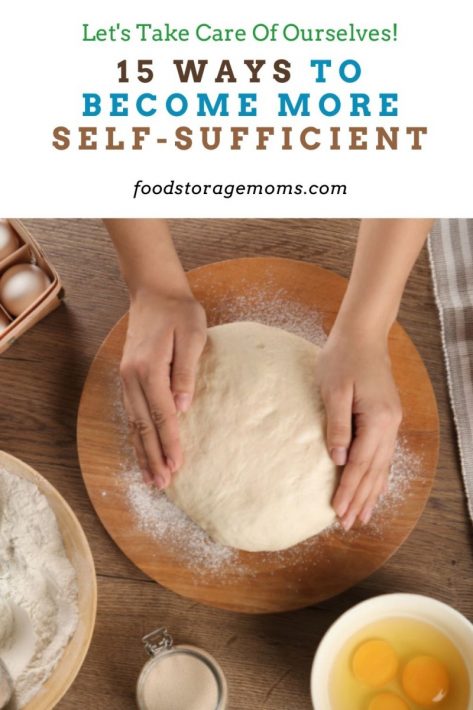
Ways to Become More Self-Sufficient
But there’s no denying it. We find ourselves living in uncertain and unprecedented times, and you just never know when those people and places that you depend on will one day no longer be available to you. That’s why you must learn these skills now so that you aren’t left scratching your head at that moment. These are 15 ways to become a more self-sufficient person.
1. Learn to Garden
Growing fruits and vegetables from your backyard is a life skill that will get you well on your way to becoming a more self-sufficient person. You’ll be rewarded with having fresher produce, while spending only a fraction of what you normally would for your fruits and vegetables. For those who don’t have some free yard space available, you can still plant vegetables in pots or use indoor grow lights. This is where I buy all of my garden seeds: SeedsNow
In case you missed this post, Container Gardens: Everything You Need To Know
2. Cooking from Scratch
With just a few staple ingredients, learning to cook from scratch is a healthier way to provide meals for your family. You’ll also save yourself money, and it tastes pretty darn good too! In case you missed this post, Cooking From Scratch 101.
Please stock food and water for your family. You must stock your own water because you don’t want to have to head to some store for water if your city has an unforeseen disaster. Please learn to make Sourdough Bread.
Each family member should have 4-gallons stored for each day you expect to be without water. This equals 28 gallons of water per person for 7 days. We need water for cooking, drinking, personal hygiene, and washing clothes and dishes. How To Store Water
3. Canning and Preserving Food
This is one that you may have seen your grandma or mother do many times as you were growing up, and it’s a skill that you should pass on to your children as well. Canning and preserving food allows you to store excellent tasting food for many years, and it’s fairly simple to do. You may feel it is more cost-effective to buy during case lot sales. Cost isn’t the only consideration. Think about the quality time you spend with family as you can those fruits, veggies, and even meat. You also control what contents are in those canned products.
4. Dehydrating Food
Dehydrating your food will extend the life of it by many years, and it tastes delicious too! You can dehydrate fruits and vegetables that you grow and harvest right out of your garden.
5. Build a Long-term Pantry
Consider stocking up your pantry space with food items such as grains, flour, rice, pasta, canned goods, and other foods that have a longer shelf life. You’ll be thankful you have them if your family ever comes across hard times. In case you missed this post, Grocery Shopping Life Skills
6. Create a Cold Cellar
For those who have space in your home to build their own cold cellar, I’d strongly encourage you to do so. This gives you more storage space for food that you’ve purchased or grown throughout the year and is a low-cost way of doing so. Usually, the cold cellar is put together in your basement where temperatures tend to be more consistent and cooler than other areas. Some people may have space under a front or back porch they could consider using. It does need to be accessible without a lot of effort or you may find it inconvenient to use.
7. Animal Husbandry
It’s more and more common these days for families to have chickens grazing somewhere on their property. In return, they are provided with fresh eggs daily, depending on how many chickens they have.
If you have space and the resources to get yourself a dairy cow that could be used for milking, this will provide you with the source that you need to make your own cheese, yogurt, or kefir.
8. Foraging for Food
Foraging is when you are searching for food and other provisions in your outdoor surroundings. It doesn’t matter where you live (unless you live in a big city). There are more foraging opportunities than you may even realize. Foraging for food provides you with edible plants and even those that can be used for medicinal purposes.
9. Learn to Hunt/Butcher Your Meat
For those of you who live in areas that have wildlife and game roaming around in your general area, learning how to hunt is a skill that only makes sense. Learning to hunt provides you with another food supply that most of us are missing out on.
Whether you choose to hunt or raise your animals for meat, knowing how to butcher them properly will allow you to process and store your meat so that it lasts much longer. It also keeps your meat from potentially getting mixed-up with someone else’s while at the butcher shop. I know that some of you have a weak stomach for this sort of thing, but there may come a day that your go-to butcher is no longer available to assist you with your kill.
10. Learn to Fish/Dress Fish
Is there a lake, river, or stream nearby where you live? If so, you’ll have access to fresh fish that may taste better than what you’ll find in the frozen food section at your local grocery store. You’ll also want to learn how to dress out your recent catch. Also, families for generations have found that fishing can be a great family pastime that brings smiles and memories for years to come.
11. Discover Natural Remedies
Weeds are more than obnoxious when you’re trying to keep your garden in pristine shape, but believe it or not, many actually do have a purpose. For starters, they’re actually good for your garden’s soil. There are many weeds out there that can be used to make natural remedies, especially elderberry, comfrey, mullein, and plantain. A few are also good additions to salads and other meal items.
12. Learn how to Sew
Most of us don’t have the time to sew or knit our own clothing. Having the necessary sewing skills can help you repair buttons or tears in clothing. This makes sure you do not have to throw them out or rely on someone else to fix them. Sewing can also be a fun “do it together” activity for family members.
13. Make Soap and Personal Care Products
Make natural soap, deodorant, moisturizers, and toothpaste. This is not only a way for you to become more self-sufficient, but it’s also incredibly cost-effective too! There’s also the comforting feeling that you know what’s in them since you gathered the ingredients and put the products together.
14. Learn First Aid Skills
By taking the time to learn necessary first-aid skills, you could very well save someone’s life one day. Everyone should know how to dress a wound, perform CPR, and correctly respond and handle a person who is in distress.
15. Create a Network
Let’s face it, folks, we can’t do everything entirely on our own. There are specific skills that our neighbors have that some of us may lack, which is why creating a network of friends and neighbors is so important. You’ll be able to barter supplies in exchange for skills, or simply borrow from one another and develop friendships along the way. What a great way to meet and make new friends who you can learn from and look to for support when needed.
Final Word
Becoming more self-sufficient will look different for everyone, especially when considering where you live. Whether you live in the country or the city, these skills are just a few you should consider. What are some other ways to become more self-sufficient? I’d love to hear from you. May God Bless this world, Linda.
Other Self-Sufficient Posts to Check Out
- Modern Homesteaders – Journey After 50
- Are You Prepared for Survival Without Doctors?
- 25 Easy Homesteading Skills We Need to Be Self-Sufficient
Copyright Images: Female Baker Bread Dough Deposit photos_275547534_s-2019

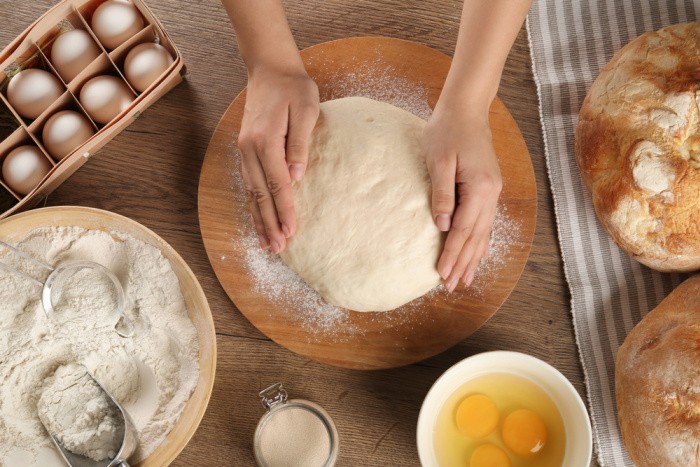




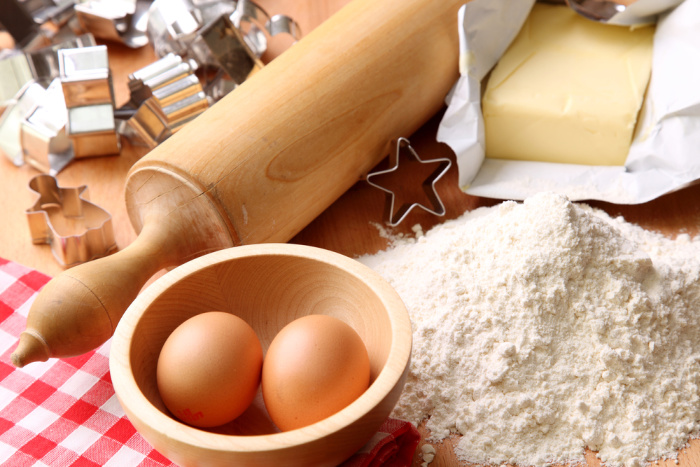
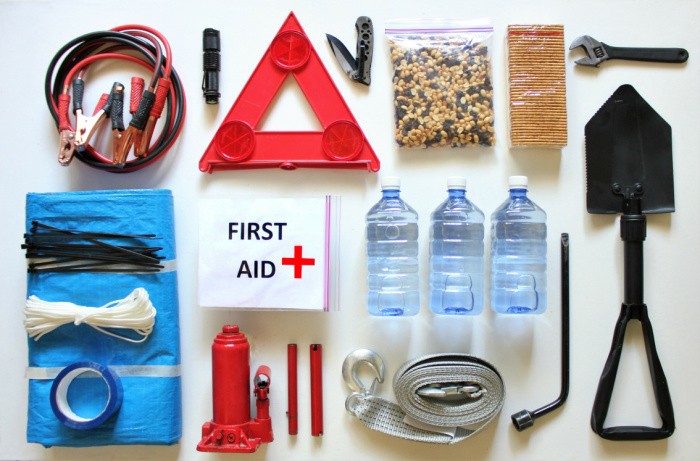
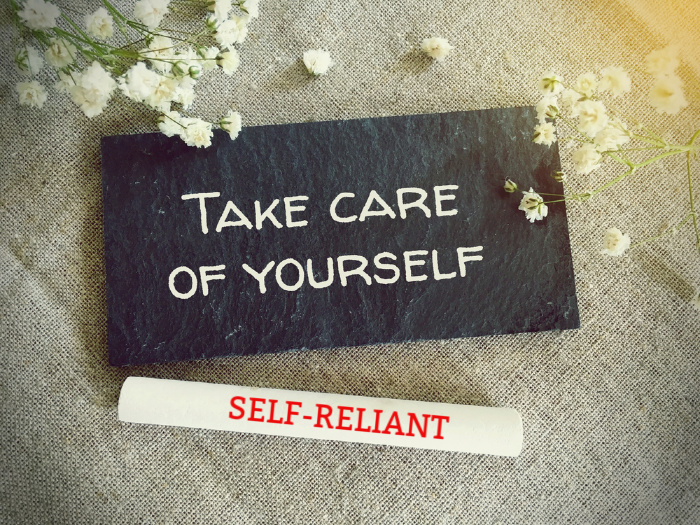













Good article. It’s not just about having stuff. It’s about “doing”.
HI Matt, I totally agree! If we can all teach our kids and grandkids a few skills, the world will be a better place! Stay safe, Linda
I have 3 wheat bread recipes to try today. You need to have good recipes you can use and trust. Also my son got a sourdough start 20 years ago that originated in the Yukon gold rush so it not only has genealogy but is very tasty with longevity so we only feed & use it every month or two. Seriously! I had a start from the Ft. Bridger area/pioneer era of Wyoming that had a great flavor but the bread was too heavy compared to the Yukon one. Sourdough picks up yeast from the air so different sourdoughs have different flavors. That’s why San Francisco sourdough is a big deal. I do have some more sourdough recipes to try for other foods that normally take baking soda/powder. There are lots of things you can make with it even cake!
I friend showed me a great way to make an easy cold cellar. Dig a hole big enough to hold a large galvanized garbage can (the ones we used to use). Put about 6″ of gravel in the bottom for drainage. Put in the can with the lid. Make a lid out of 2×4’s or whatever you can put together. Make sure it is convenient to get to in cold/snowy weather. You just lift off the lids and your veggies store nicely underground. It is insulated enough by the dirt that the food doesn’t freeze. This holds plenty for my family all winter.
A network can be very helpful. I need to work on that more but worry that I’ll hurt OPSEC and end up with a group of people that rely on me and tell others. I used to teach classes and run the area CERT but stopped years ago and hoping people have forgot or moved. Still my garden is visible from the street and there is nothing I can do about that. If I block off visibility then I lose precious sunlight and people have already walked by it for years . How do others find a good network without putting themselves at risk? Preppers are usually a pretty closed mouth group – for a good reason.
Hi Kay, I get criticized sometimes because I’m an open book. I really don’t care, I feel I must teach the world how to be prepared. As I teach I also learn, like today with your galvanized garbage can for storing vegetables. I think, “Why didn’t I think of that?” LOL! We all learn from each other, so it makes life so good. Our neighborhood is not into preparedness. I used to teach classes in the local churches and neighborhoods. The problem is your heart has to be in preparedness and make a way of life. Some people do not feel the need to be prepared. It’s about choices. I get it. BUT I cannot feed the neighborhood, moneywise or physically. I love hearing your garden is visible from the street, I hope it stays safe, BUT I hope people learn how fun it is to grow your own food. Example is everything. Stay safe, you are rocking preparedness. Linda
Hi Linda, I agree with you about teaching our children to learn the basic skills. Some how, the schools have taken basic economics from the teaching requirements. My granddaughter who is now 22, said it would’ve been nice to learn how to write checks, cook, and sew a button, and who cares about a dimension of a box and geometry. I dehydrate, fruits, veggies, make jerky, I can meats, veggies, fruit, soups, I make jams and jelly. I have 3 freezers. I have stocked up on flour, sugar, can goods. My mom taught all her kids to do this. Somehow, I am the only one who does it. When the pandemic hit, and stores were empty. I had the soup, and extras that they needed. I am proud that I learned all of this from my mom. She’s gone now, and I thank her every time something happens, and I have what I need, and can help my family, and others.
Hi Cindy, it’s really too bad that the schools have taken out all of these skills. And now the churches have taken out social activities with one another. We all need to learn skills and have positive human interaction with one another. There is more to life than the ABC’s and spirituality in life. Enough said. God help us all. Linda
Linda, one of the best and most succinct articles you’ve written. I would add learn how to build a solar power generator, and learn how to cook with a sun oven to the list.
Hi Ray, thank you for your kind words. Great reminder on solar generators and sun ovens, thank you, my friend. Linda
Ray,
Great comment. This summer I’m going to work on my sun oven and Dutch Oven cooking skills. Even the wood stove takes some experience (after smoking out the house at first). If you lose power you are going to need alternate ways of cooking. I don’t want to be dealing with the worry of learning a new skill and the learning curve while under the stress of SHTF or even a power outage. From experience with multiple disasters I’ve found your brain freezes up in shock/trauma and things will need to be simple – not a time to pull out a manual or trying to find supplies & equipment.
Yesterday I baked blueberry zucchini bread in my sun oven. Today I’m cooking chicken a la king (using home canned chicken, broccoli, bok choi and snow peas from my garden and a slew of other oriental veggies. It takes practice to get good results–just like most any skill. I’m told I can roast a whole chicken in it but I’ve been too chicken to try.
Hi Ray, now my mouth is watering! I wish every family had a Sun Oven, if they have a lot of sunshine that is! Linda
I haven’t tested this yet but the Sun Oven people say so long as you can see a shadow a Sun Oven will cook your meal. If you have some clouds it just takes a little longer.
Hi Ray, I have used mine when we had freezing temps here, in Southern Utah, and as long as I cook between 10:00 and 3:00 it works really well. When it’s overcast it’s really hard to get the temperatures up. The nice thing we have like 300+ days of sunshine here so we have a LOT of days we can use it. Linda
Hi Linda. Another of your great articles! Better to prepare ahead of time than race to catch up when things get bad. Once again, knowledge on emergency lighting can also make life easier in a crises. The book “Olive Oil Lamps &c.” from The Non-Electric Lighting Series is a pretty good place to start. Here’s a link: https://www.amazon.com/gp/product/B00KB7F9SU/ref=series_rw_dp_sw Hope this helps.
Hi Ron, thank you for the reminder on that awesome book!! Linda
I built an earthen oven to bake bread and cook anything you can do in a modern oven.
It uses fire to heat the oven, no electricity needed.
I learned how to build this watching videos from James Townsend and Son.
Hi John, oh I LOVE hearing this, I would love to build one of those! I need to go check out his videos! Thank you!! Linda
You’re welcome!